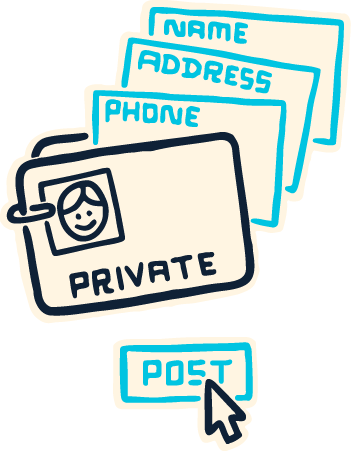Gently lead a conversation with learners about the risks and issues posed by doxing. Help them know what to do if they fall victim to doxing
About This Module
This curriculum module is based on takeaways from series two of NYC Digital Safety training videos. You may use this module by:
- Including it in your pre-existing public workshops
- Combining it with other NYC Digital Safety modules to make a longer data-privacy focused workshop
- Sharing the handout with library users at various service points
Downloadable presentation slides, a facilitation guide, and a handout can be found below.
Learning Outcomes
By the end of this module, learners will be able to:
- Define doxing
- Discuss the causes and effects of doxing
- Identify and use different approaches for both avoiding doxing and dealing with a doxing attack that has occurred
Lesson Plan
This lesson plan is also included in the downloadable facilitation guide below. You are welcome to use any and all of this, or adapt it as you see fit.
This module will take approximately 60 to 90 minutes to complete.
Introduction and welcome
Greet learners and review the plan for this module
Define doxing
Provide a working definition of doxing. See if anyone has any questions or anything to add
Discussion: Your experiences with doxing
Ask your learners to discuss and share what they know about doxing and see if any of them have any examples or incidents they’ve heard about to share
What doxing is and how it happens
Share basic concepts around doxing and why it occurs. Pause to see if your learners have anything else to add to these lists
Discussion: Cyberbullying
Ask learners to share examples, experiences with, or thoughts on cyberbullying
What to do during a doxing incident
Review steps for what to do if you’ve been doxed
Strategies to use to avoid doxing
Share best practices for avoiding an incident in the future
Discussion: How to avoid doxing
Put learners into small groups. Have them discuss and brainstorm ways to avoid doxing
Doxing and online participation
Emphasize that doxing is often used as a tool to initiate and threaten people. Encourage learners to protect their online security and to take steps to protect themselves from doxing
Wrap up, final tips, and final questions
Review the closing thoughts and share the suggested resources. See if anyone has any final questions
Next Steps
Download the materials below for use in your workshop or at service points throughout your library.
If you plan to create a longer privacy-focused workshop using these materials, here is a link to Google slides. Feel free to make a copy if you’d like to add these slides to any other deck.
And please let us know how it went! Use this form to share your feedback on this module. We’d love to hear from you.
